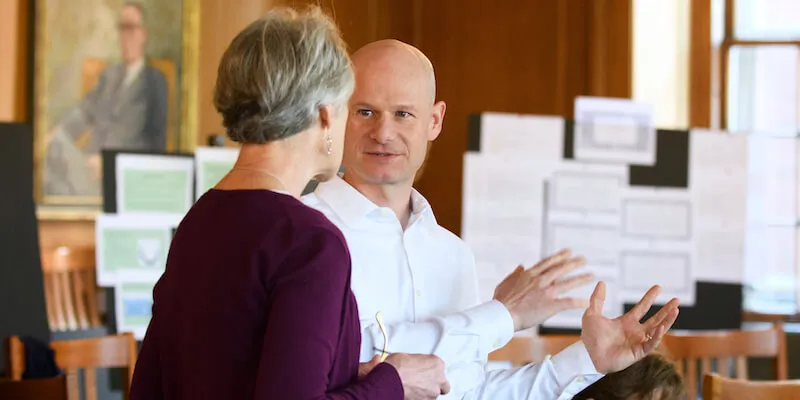What does it take to help youth who are at-risk of dropping out complete high school and prepare to transition into adulthood?
Dr. Jesse Suter is finding that leadership, data, and time are among the key ingredients.
Students with emotional and behavioral challenges have one of the highest dropout rates—nearly 45 percent—yet they rarely receive the individualized supports needed to help them succeed and graduate from high school.
Suter, executive director of UVM’s Center on Disability and Community Inclusion, is leading a four-year U.S. Department of Education $3.5 million research grant to study RENEW, a structured school-to-career transition planning and individualized intervention for youth with emotional and behavioral challenges.
RENEW (Rehabilitation, Empowerment, Natural supports, Education and Work) was developed in 1996 by staff at the Institute on Disability at the University of New Hampshire. It is an intensive program that pairs a student with a team consisting of a trained RENEW coach, facilitator, and school coordinator.
This research study tests whether the RENEW program can improve academic performance for the estimated 5-10 percent of high school students at risk for school failure due to emotional and behavioral challenges. Participating schools in the study are located in New Hampshire, Vermont, Illinois, and Maryland.
“The RENEW process is not just about spending time with students, but also understanding a student well enough to see what they’re good at, what they’re interested in, and where they see themselves eventually in terms of a career path,” Suter says. “Another thing about the RENEW approach is that it requires strong leadership and support at the school level.”
While Suter has identified RENEW success stories, his research has also come across schools that have struggled to implement the program or found mixed results.
Issues range from lack of time and training among team members to schools lacking the systems to properly identify at-risk students.
“For RENEW to work, you need a highly engaged and committed team to do the work. That team needs to have adequate time to do the work,” Suter says. “It can take a half-day a week to work with one student. So, for some schools, even though that time was agreed to by staff members, none of their previous responsibilities went away. In the big picture, that time is worth it because if kids drop out, it’s a huge societal cost. That means you have to change the system and have leadership find how RENEW can fit into their schools and work for everyone.”
Moving Ahead with RENEW
JoAnne Malloy, Ph.D., a research associate professor at the University of New Hampshire, was the original architect of RENEW nearly 25 years ago, and worked closely with Suter on his research.
“Jesse was very generous and open to our ideas. He listened to our ideas and respected our many years of experience with implementing the (RENEW) intervention,” says Malloy. “In addition, he always circled back and included us before any decisions were made. I really appreciated his honestly when he identified problems.”
As the study winds down and Suter prepares to publish his research next year, he hopes more schools in Vermont will implement RENEW.
“As a researcher, I hope this study will provide practical guidance and identify some of the indicators for schools to determine whether to adopt RENEW,” Suter says.
Leading the Center on Disability and Community Inclusion at UVM
Suter knew there was something special about UVM the moment he set foot on campus 19 years ago.
Arriving at UVM as a clinical psychology doctoral student, Suter and his wife were instantly impressed by the University’s campus community and faculty. It wasn’t long before the couple decided to plant roots and make Vermont their permanent home.
Along the way, Suter eventually found his second home at the Center on Disability and Community Inclusion (CDCI), which is part of a national network of University Centers for Excellence in Developmental Disabilities. One of its sister centers is the Institute on Disability at UNH—home of RENEW. Since 1974, CDCI has shared knowledge and resources with the University of Vermont and communities throughout Vermont.
Suter was appointed executive director in April 2018, and his leadership is valued by faculty and staff alike.
“Jesse has a talent for bringing people together, listening to integrate various perspectives, facilitating problem-solving, and getting things done,” says UVM Professor Michael Giangreco, Ph.D., project Director of EVOLVE Plus at CDCI. “Jesse embodies these inclusive values that have been the bedrock of the CDCI since its inception. He combines them with evidenced-based practices, creative problem-solving, and his own personal qualities to bring vibrant leadership to the Center.”
